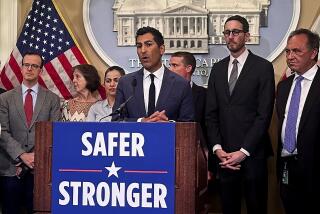Lawmakers Near Deal on 2 Secession Bills
- Share via
The first summit meeting between the three authors of two major Valley secession bills failed to produce an accord Monday, although Assemblyman Tom McClintock (R-Northridge) said the lawmakers are “tantalizingly close” to agreement.
The sticking point is a fundamental disagreement about a state-funded study of the impacts of Valley secession that state Senate leader Bill Lockyer insists on including in the measure he has introduced in the Senate.
Assemblyman Bob Hertzberg (D-Sherman Oaks), co-sponsor with McClintock of another secession bill that has cleared the Assembly, objects to the study as a Band-Aid approach because it would be conducted independently, rather than as part of the existing mechanism for reviewing municipal breakups and incorporations.
“We just keep adding on a rule,” Hertzberg said Tuesday. “I want to incorporate the study into the existing process.”
A spokesman for Lockyer said McClintock is trying to negotiate a compromise.
Lockyer’s bill requiring the study is in abeyance until the budget comes up for consideration later in the session because the measure would appropriate money for the study. It is tentatively scheduled to be the subject of a hearing at the end of May by the Senate Appropriations Committee, which killed the secession bill last year.
While minimizing his role as a peacemaker, McClintock said he, too, has concerns about the study and had offered a number of unspecified changes to Lockyer.
“I’m hopeful we can reach agreement,” McClintock said. “I’d say we’re tantalizingly close.”
Lockyer spokesman Sandy Harrison said Lockyer refuses to yield on the study because he owes it to racial minority group members of the Senate Democratic caucus, who oppose making it easier to split up Los Angeles.
“The only way he [Lockyer] can overcome the objections of minority members of our caucus is to at least make sure they get a fair study out of it,” Harrison said.
Because there are no concrete data on the impacts of secession on either the Valley or the rest of the city, much of the discussion on the issue has been rhetorical and anecdotal.
Harrison said Hertzberg’s bill has no chance of prevailing without Lockyer’s support when it reaches the Senate. That was certainly the case last summer, when Lockyer jettisoned former Assemblywoman Paula Boland’s secession bill because she refused to accept his terms.
But, noting that the McClintock-Hertzberg bill passed the Assembly 74 to 1, Hertzberg does not agree that his secession bill is doomed without Lockyer.
Lockyer did agree to drop his demand for a statewide commission to study detachment and incorporation law after signals from the governor’s office that such a provision would get the bill vetoed.
Neither bill calls for or initiates secession, but both facilitate secession by removing the veto power of the City Council over secession requests. The veto power essentially meant no secession movement could succeed because it is not in the interest of the council to cede territory and tax revenue.
But it was eventually difficult for even secession foes to argue that the veto power was democratic.
Valley supporters of the various secession bills, some of whom oppose secession itself, argue that without the veto power, the City Council will be forced to pay more attention to local concerns, obviating the need to break away.
More to Read
Get the L.A. Times Politics newsletter
Deeply reported insights into legislation, politics and policy from Sacramento, Washington and beyond. In your inbox three times per week.
You may occasionally receive promotional content from the Los Angeles Times.










